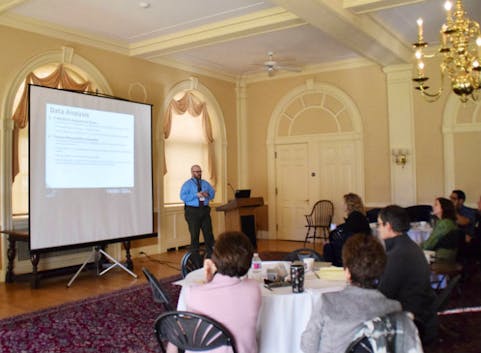DNP Students Design Projects to Improve Health Care
By Nora Williamson
Friday, February 3, 2017
“How can we become better at handling pediatric traumas in the emergency room?”
“Can we provide music to medical intensive care unit patients to help reduce post-intensive care cognitive and psychological impairment?
“How can we reduce rates of skin cancer among at-risk heart transplant patients?”
Those are just some of the questions Doctor of Nursing Practice (DNP) students are seeking to answer as part of their final projects, which they presented to colleagues and faculty members at DNP Project Day late last month. In its ninth year, the event offers students a chance to present their projects to their professors and colleagues in order to gain feedback and suggestions before their doctoral defenses.
“This event is always a highlight of the program for me, because it provides students with an opportunity to showcase their clinical expertise and scholarly work and to see what kind of impact they are having in their practice settings,” said Lydia Rotondo, DNP, RN, CNS, associate dean for education and student affairs and the director of the DNP program at the University of Rochester School of Nursing.

As the recommended pathway for entry into advanced practice nursing practice, DNP coursework provides students with a strong foundation to accelerate evidence translation, critically appraise the practice environment, and drive organizational change as practice leaders. During the last phase of their DNP education, the students use that knowledge to design an initiative to improve clinical practice or influence health policy.
The eight projects presented at this year’s DNP day were wide-ranging, focusing on everything from providing NP-led telemedicine care to pediatric neurology patients to creating a transgender cultural education program. The goals of the projects demonstrate the transformation the students experience as they progress through what many of them call the “DNP journey.”
“When you’re a nurse, you’re focused on the patient and taking care of him or her,” said Anna Sorensen, MS, FNP, RN. “DNPs aim to have a broader, global perspective. While we still love to take care of our patients and do not want to leave the bedside or clinic, we also understand there is more we can do for the entire population we care for. We bring a different perspective to health care.”
Like many of the students, Sorensen chose a project that could enhance her current role. She is a heart transplant coordinator at the Medical Center.
“Patients who undergo a heart transplant are more susceptible to cancer and other diseases, and skin cancer is the most common disease among these patients,” she said. “They are 65 to 200 times more likely to develop skin cancer than the general population.”
To help tackle that issue, Sorensen developed an intensive educational program to help these patients understand the personal risks and engage in behavior that will reduce the risk of developing the disease — so that if cancer develops, it can be caught before it becomes invasive, requires surgery, or spreads.
Other students, like Sorensen’s classmate Deborah Hurley, MS, RN, CNL, CCRN, found inspiration for their projects from their own personal experiences.
“My brother was critically ill in the ICU three years ago, and that’s when I really began to appreciate that we could do a better job of supporting these patients and helping optimize their outcomes. They have significant challenges after they’re out of our care,” said Hurley, who designed a musical intervention to help decrease cognitive and psychological impairment that can affect ICU survivors.
Sorensen and Hurley are two of five DNP students who plan on defending their projects and graduating this spring. Although they’ve both put in a great deal of work and have taken time away from their families to pursue their education, both say it’s been worth it.
“I have always wanted to gain more knowledge, and I think we owe it to our patients to know as much as possible,” said Sorensen. “I’ve been away from my family a lot, but all three of my daughters are very driven, and now, to them, getting a doctorate is normal — it’s just what you do.”
Learn more about the UR School of Nursing's DNP program.
